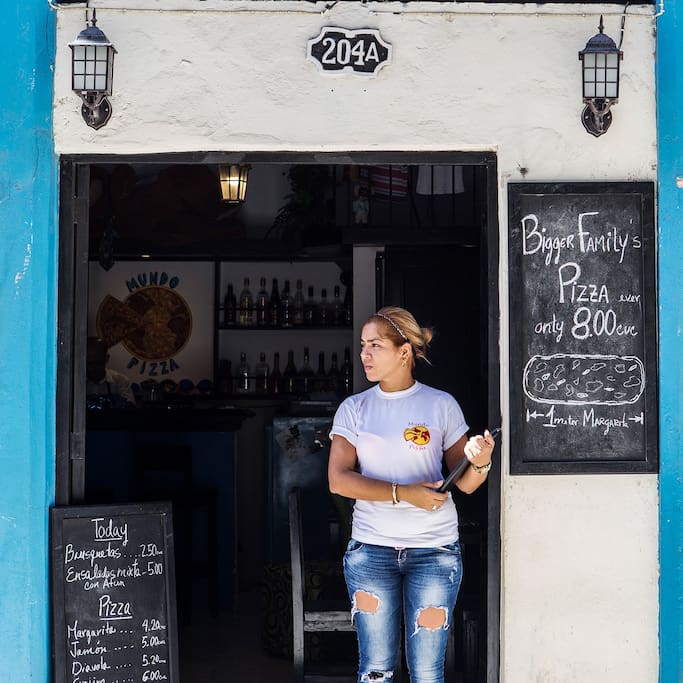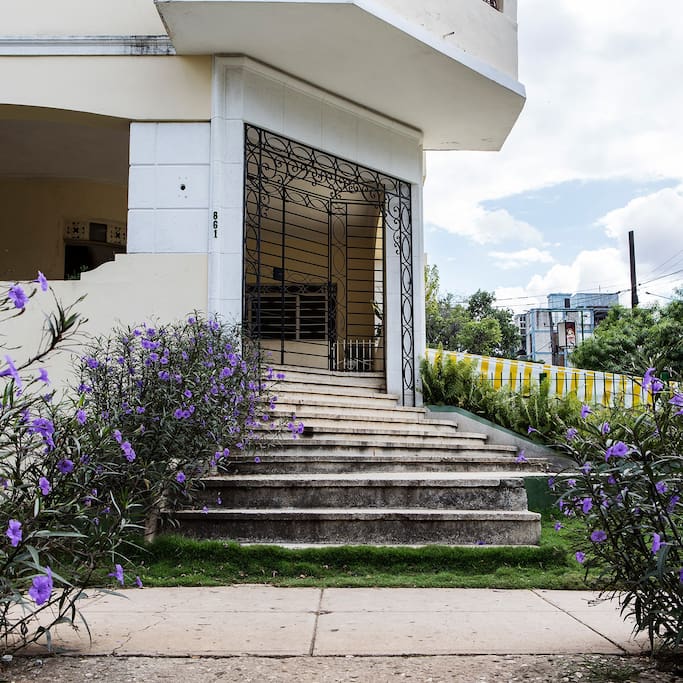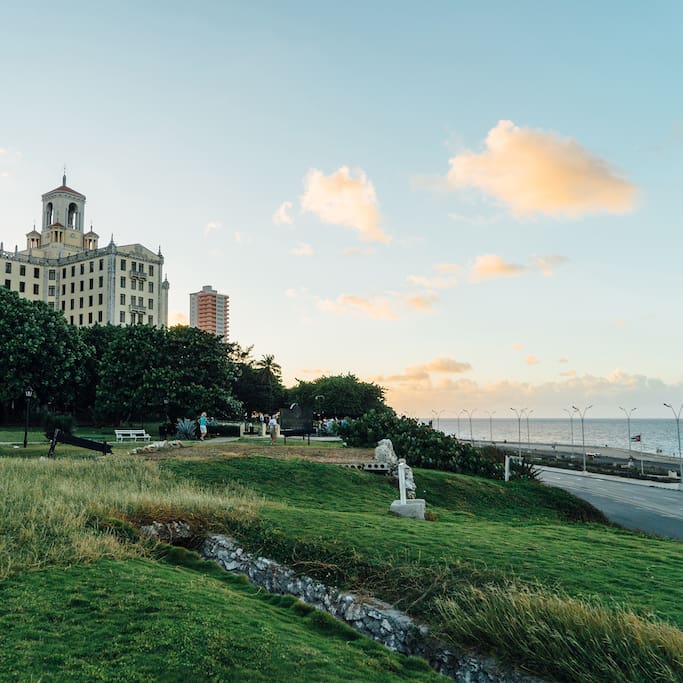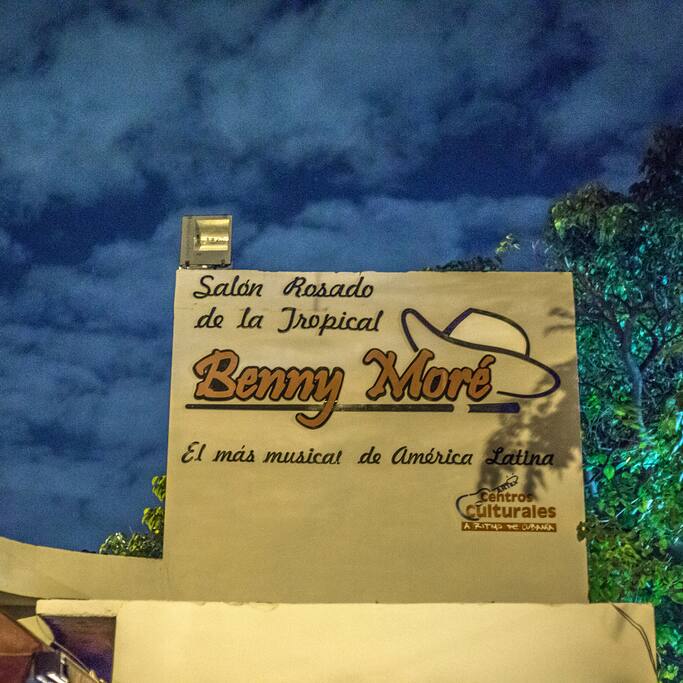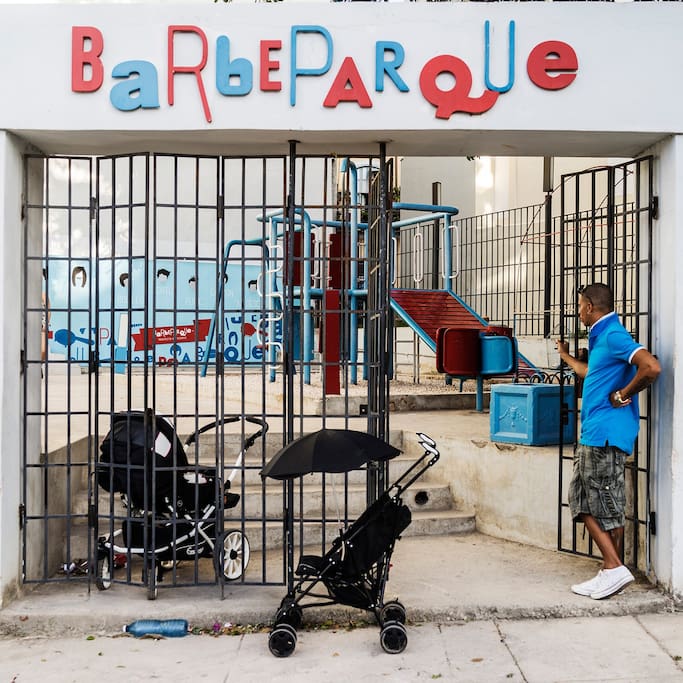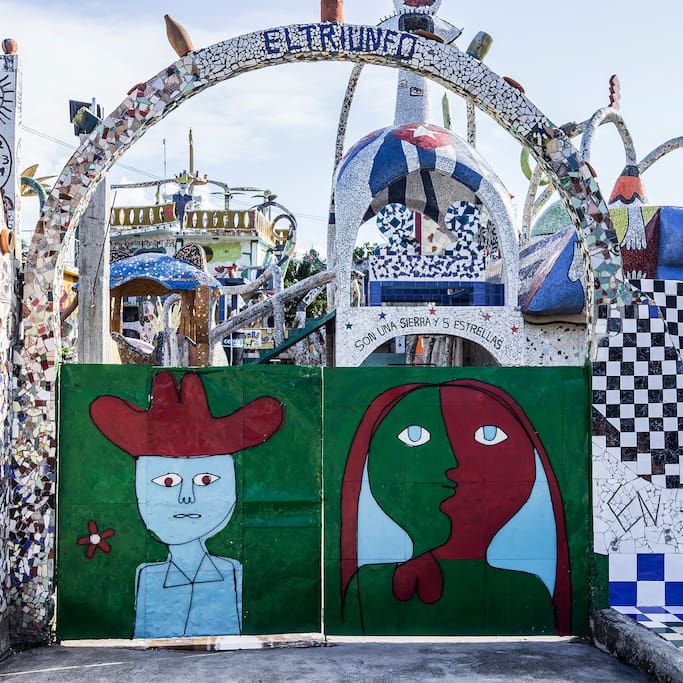Drinks & Nightlife
Tropicana es un famoso cabaré cubano creado en 1939, en La Habana. Es conocido como "un paraíso bajo las estrellas", pues fue construido al aire libre en una zona boscosa aprovechando el fresco de los árboles, convirtiéndose en un cabaré completamente diferente a los tradicionales.
326 il-persuni tal-post jissuġġerixxu
Tropicana Club
72 ATropicana es un famoso cabaré cubano creado en 1939, en La Habana. Es conocido como "un paraíso bajo las estrellas", pues fue construido al aire libre en una zona boscosa aprovechando el fresco de los árboles, convirtiéndose en un cabaré completamente diferente a los tradicionales.
La Fábrica de Arte Cubano es una galería de arte y club en La Habana, Cuba. La galería y el escenario se establecieron en el interior de una antigua fábrica de aceite de cocina, y desde entonces ha adquirido notoriedad como uno de los principales clubes nocturnos y galas de arte de la capital cubana.
1418 il-persuni tal-post jissuġġerixxu
Fábrica de Artes Cubana
& Calle 26La Fábrica de Arte Cubano es una galería de arte y club en La Habana, Cuba. La galería y el escenario se establecieron en el interior de una antigua fábrica de aceite de cocina, y desde entonces ha adquirido notoriedad como uno de los principales clubes nocturnos y galas de arte de la capital cubana.
La mejor terraza de La Habana para tomar unos cócteles y cenar algo al aire libre. La puesta de sol es espectacular. Se puede mirar el Capitolio desde su mirador. En las noches hay música en vivo y los sábados fiestas rojas con sesiones de DJ.
Restaurante Yarini Habana
La mejor terraza de La Habana para tomar unos cócteles y cenar algo al aire libre. La puesta de sol es espectacular. Se puede mirar el Capitolio desde su mirador. En las noches hay música en vivo y los sábados fiestas rojas con sesiones de DJ.
Sumérgete en una noche mágica en el Cabaret Parisien. Vive la esencia de la cultura cubana con danzas indoamericanas, hispanas y africanas. Artistas talentosos y detalles vibrantes te esperan.
236 il-persuni tal-post jissuġġerixxu
Cabaret Parisien
Calle OSumérgete en una noche mágica en el Cabaret Parisien. Vive la esencia de la cultura cubana con danzas indoamericanas, hispanas y africanas. Artistas talentosos y detalles vibrantes te esperan.
Food Scene
La Bodeguita del Medio is a typical restaurant-bar of Havana (Cuba). It is a famous tourist destination because of the personalities which have patronized it. La Bodeguita lays claim to being the birthplace of the Mojito cocktail, prepared in the bar since its opening in 1942, although this is disputed. The rooms are full of curious objects, frames, photos, as well as the walls covered by signatures of famous or unknown customers, recounting the island’s past. 10 minutes from Casa Quintana in taxi.
742 il-persuni tal-post jissuġġerixxu
La Bodeguita Del Medio
EmpedradoLa Bodeguita del Medio is a typical restaurant-bar of Havana (Cuba). It is a famous tourist destination because of the personalities which have patronized it. La Bodeguita lays claim to being the birthplace of the Mojito cocktail, prepared in the bar since its opening in 1942, although this is disputed. The rooms are full of curious objects, frames, photos, as well as the walls covered by signatures of famous or unknown customers, recounting the island’s past. 10 minutes from Casa Quintana in taxi.
El Floridita is a historic fish restaurant and cocktail bar in the older part of Havana (La Habana Vieja), Cuba. It lies at the end of Calle Obispo (Bishop Street), across Monserrate Street from the The National Museum of Fine Arts of Havana (Museo Nacional de Bellas Artes de La Habana). The establishment is famous for its daiquiris and for having been one of the favourite hangouts of Ernest Hemingway in Havana. Eigth minutes by taxi from Casa Quintana.
764 il-persuni tal-post jissuġġerixxu
El Floridita Bar
ObispoEl Floridita is a historic fish restaurant and cocktail bar in the older part of Havana (La Habana Vieja), Cuba. It lies at the end of Calle Obispo (Bishop Street), across Monserrate Street from the The National Museum of Fine Arts of Havana (Museo Nacional de Bellas Artes de La Habana). The establishment is famous for its daiquiris and for having been one of the favourite hangouts of Ernest Hemingway in Havana. Eigth minutes by taxi from Casa Quintana.
El Vampirito
Paseo Marítimo 1ra y 70
Sightseeing
Parque de la Fraternidad (Plaza of the American Fraternity), is a group of several parks located at the south end of the Paseo del Prado Walk in Havana. It is one of the most central and busiest areas of the city, since it is used as a location for several Metrobus and taxi lines. In addition, there are very important buildings and monuments, such as the Fountain of India, The Capitol, Aldama Palace and Hotel Saratoga among many others. This area is one of the main gates to colonial Habana Vieja. Ten minutes in taxi from Casa Quintana.
52 il-persuni tal-post jissuġġerixxu
Parque De La Fuente De La India
Parque de la Fraternidad (Plaza of the American Fraternity), is a group of several parks located at the south end of the Paseo del Prado Walk in Havana. It is one of the most central and busiest areas of the city, since it is used as a location for several Metrobus and taxi lines. In addition, there are very important buildings and monuments, such as the Fountain of India, The Capitol, Aldama Palace and Hotel Saratoga among many others. This area is one of the main gates to colonial Habana Vieja. Ten minutes in taxi from Casa Quintana.
The Hotel Nacional de Cuba is a historic luxury hotel located on the Malecón, in Vedado neighborhood. It stands on Taganana Hill a few metres from the sea, and offers a view of Havana Harbor, the seawall and the city. Its "a must" if you go to Havana specially if you are in the neighborhood. The hotel was developed by the US firm of Purdy and Henderson, and designed by the New York architectural firm of McKim, Mead and White in a mix of styles including Sevillian, Roman, Moorish and Art Deco. The hotel was constructed on the site of the Santa Clara Battery, which dates back to 1797. Part of the battery has been preserved in the hotel's gardens. Casa Quintana is just two blocks away.
552 il-persuni tal-post jissuġġerixxu
Hotel Nacional de Cuba
The Hotel Nacional de Cuba is a historic luxury hotel located on the Malecón, in Vedado neighborhood. It stands on Taganana Hill a few metres from the sea, and offers a view of Havana Harbor, the seawall and the city. Its "a must" if you go to Havana specially if you are in the neighborhood. The hotel was developed by the US firm of Purdy and Henderson, and designed by the New York architectural firm of McKim, Mead and White in a mix of styles including Sevillian, Roman, Moorish and Art Deco. The hotel was constructed on the site of the Santa Clara Battery, which dates back to 1797. Part of the battery has been preserved in the hotel's gardens. Casa Quintana is just two blocks away.
Plaza De La Revolucion
Avenida PaseoThis wave-lashed fort with its emblematic lighthouse was erected between 1589 and 1630 to protect the entrance to Havana harbor from pirates and foreign invaders (French corsair Jacques de Sores had sacked the city in 1555). Perched high on a rocky bluff above the Atlantic, the fort has an irregular polygonal shape, 3 meters thick walls and a deep protective moat, and is a classic example of Renaissance military architecture.
For more than a century the fort withstood numerous attacks by French, Dutch and English privateers, but in 1762 after a 44-day siege a 14,000-strong British force captured El Morro by attacking from the landward side. The Castillo's famous lighthouse was added in 1844.
566 il-persuni tal-post jissuġġerixxu
Castillo de los Tres Reyes Magos del Morro
This wave-lashed fort with its emblematic lighthouse was erected between 1589 and 1630 to protect the entrance to Havana harbor from pirates and foreign invaders (French corsair Jacques de Sores had sacked the city in 1555). Perched high on a rocky bluff above the Atlantic, the fort has an irregular polygonal shape, 3 meters thick walls and a deep protective moat, and is a classic example of Renaissance military architecture.
For more than a century the fort withstood numerous attacks by French, Dutch and English privateers, but in 1762 after a 44-day siege a 14,000-strong British force captured El Morro by attacking from the landward side. The Castillo's famous lighthouse was added in 1844.
Arts & Culture
The Museo Nacional de Bellas Artes – Arte Cubano displays purely Cuban art and, if you're pressed for time, is the better of the duo. Works are displayed in chronological order starting on the 3rd floor and are surprisingly varied. Artists to look out for are Guillermo Collazo, considered to be the first truly great Cuban artist; Rafael Blanco, with his cartoonlike paintings and sketches; Raúl Martínez, a master of 1960s Cuban pop art; and the Picasso-like Wifredo Lam. Fifteen minutes in taxi from Casa Quintana.
851 il-persuni tal-post jissuġġerixxu
Museo Nacional de Bellas Artes
ObispoThe Museo Nacional de Bellas Artes – Arte Cubano displays purely Cuban art and, if you're pressed for time, is the better of the duo. Works are displayed in chronological order starting on the 3rd floor and are surprisingly varied. Artists to look out for are Guillermo Collazo, considered to be the first truly great Cuban artist; Rafael Blanco, with his cartoonlike paintings and sketches; Raúl Martínez, a master of 1960s Cuban pop art; and the Picasso-like Wifredo Lam. Fifteen minutes in taxi from Casa Quintana.
Without a doubt one of the best museums in Havana and, by definition, Cuba, this magnificently laid-out collection of 7000 objects associated with the life of Napoleon Bonaparte was amassed by Cuban sugar baron Julio Lobo and politician Orestes Ferrara. Highlights include sketches of Voltaire, paintings of the Battle of Waterloo, china, furniture, an interesting re-creation of Napoleon's study and bedroom, and one of several bronze Napoleonic death masks made two days after the emperor's death by his personal physician, Francisco Antommarchi. It's set over four floors of a beautiful Vedado mansion next to Havana University. Stunning views from its terrace. Ten minute walk from Casa Quintana.
216 il-persuni tal-post jissuġġerixxu
Napoleon Museum
Without a doubt one of the best museums in Havana and, by definition, Cuba, this magnificently laid-out collection of 7000 objects associated with the life of Napoleon Bonaparte was amassed by Cuban sugar baron Julio Lobo and politician Orestes Ferrara. Highlights include sketches of Voltaire, paintings of the Battle of Waterloo, china, furniture, an interesting re-creation of Napoleon's study and bedroom, and one of several bronze Napoleonic death masks made two days after the emperor's death by his personal physician, Francisco Antommarchi. It's set over four floors of a beautiful Vedado mansion next to Havana University. Stunning views from its terrace. Ten minute walk from Casa Quintana.
This emblematic museum resides in the former Presidential Palace, built between 1913 and 1920 and used by Cuban presidents, culminating in Fulgencio Batista. The world-famous Tiffany's of New York decorated the interior, and the shimmering Salón de los Espejos (Hall of Mirrors) was designed to resemble the eponymous room at the Palace of Versailles. The palace's sweeping central staircase, still retains the bullet holes made during an unsuccessful attack on the palace in March 1957 by a revolutionary student group.
The stairs take you up to the 2nd floor and several important exhibit-free rooms, including the Salón Dorado, decorated in Louis XVI style. 12 minutes in taxi from Casa Quintana.
779 il-persuni tal-post jissuġġerixxu
Mużew tal-Rivoluzzjoni
Avenida BélgicaThis emblematic museum resides in the former Presidential Palace, built between 1913 and 1920 and used by Cuban presidents, culminating in Fulgencio Batista. The world-famous Tiffany's of New York decorated the interior, and the shimmering Salón de los Espejos (Hall of Mirrors) was designed to resemble the eponymous room at the Palace of Versailles. The palace's sweeping central staircase, still retains the bullet holes made during an unsuccessful attack on the palace in March 1957 by a revolutionary student group.
The stairs take you up to the 2nd floor and several important exhibit-free rooms, including the Salón Dorado, decorated in Louis XVI style. 12 minutes in taxi from Casa Quintana.
In 1975, after moving into a modest wood house in the rundown neighborhood of Jaimanitas outside Havana, José Fuster set about decorating his studio in colorful mosaic. Once he was done there, he asked his neighbors if he could decorate their homes and business as well. A few accepted his offer and the tile creations grew. Over the course of a decade, doctors’ offices, bus stops, fountains, benches, gateways, and more were enveloped by Fuster’s whimsical imagination. Today, his artwork coats the neighborhood in a rainbow of strange, enchanting fantasy. Jaimanitas was an economically depressed area before Fuster arrived, and now it has turned into an artist’s paradise.
116 il-persuni tal-post jissuġġerixxu
Fusterlandia
In 1975, after moving into a modest wood house in the rundown neighborhood of Jaimanitas outside Havana, José Fuster set about decorating his studio in colorful mosaic. Once he was done there, he asked his neighbors if he could decorate their homes and business as well. A few accepted his offer and the tile creations grew. Over the course of a decade, doctors’ offices, bus stops, fountains, benches, gateways, and more were enveloped by Fuster’s whimsical imagination. Today, his artwork coats the neighborhood in a rainbow of strange, enchanting fantasy. Jaimanitas was an economically depressed area before Fuster arrived, and now it has turned into an artist’s paradise.
Joya del patrimonio neoclásico cubano, fue construído por Ricardo Irijoa en 1884. Originalmente bautizado como Teatro Irijoa, fue renombrado como Teatro Martí tras la independencia cubana en honor a José Martí, líder del Partido Revolucionario Cubano y padre de la independencia cubana.
99 il-persuni tal-post jissuġġerixxu
Teatro Martí
Joya del patrimonio neoclásico cubano, fue construído por Ricardo Irijoa en 1884. Originalmente bautizado como Teatro Irijoa, fue renombrado como Teatro Martí tras la independencia cubana en honor a José Martí, líder del Partido Revolucionario Cubano y padre de la independencia cubana.
El Capitolio Nacional de La Habana fue construido en 1929 por encargo del entonces presidente cubano Gerardo Machado para albergar la Cámara de Representantes y el Senado de la República de Cuba. Inspirado en el capitolio de Washington (Estados Unidos), es el origen kilométrico de la red de carreteras cubanas y uno de los monumentos más visitados por los turistas, atraídos por la riqueza de su ornamentación y la calidad de los materiales empleados.
Capitolio
El Capitolio Nacional de La Habana fue construido en 1929 por encargo del entonces presidente cubano Gerardo Machado para albergar la Cámara de Representantes y el Senado de la República de Cuba. Inspirado en el capitolio de Washington (Estados Unidos), es el origen kilométrico de la red de carreteras cubanas y uno de los monumentos más visitados por los turistas, atraídos por la riqueza de su ornamentación y la calidad de los materiales empleados.
Denominada así en 1961, poco después del fin de la Revolución cubana, la plaza fue construida originalmente por el gobernante cubano Fulgencio Batista con el nombre de Plaza Cívica, y se concibió para albergar el monumento a José Martí (padre de la independencia cubana), que consiste en una torre de 112 metros de altura (142 si contamos la bandera) y una estatua de mármol de Martí de 18 metros.
826 il-persuni tal-post jissuġġerixxu
Plaza De La Revolucion
Avenida PaseoDenominada así en 1961, poco después del fin de la Revolución cubana, la plaza fue construida originalmente por el gobernante cubano Fulgencio Batista con el nombre de Plaza Cívica, y se concibió para albergar el monumento a José Martí (padre de la independencia cubana), que consiste en una torre de 112 metros de altura (142 si contamos la bandera) y una estatua de mármol de Martí de 18 metros.
Shopping
The five-star hotel Tryp Habana Libre, one of the most emblematic hotels in Havana, is located in the heart of Vedado. The hotel offers breathtaking views of the city and the sea. 24-hour medical service Art gallery. Boutique Car; Rental Concierge. Craftworks. Facilities for physically disabled persons. Fax service. Foreign currency exchange. Gift shop. Internet connection. Laundry and dry cleaning services. Mini market. Parking. Satellite TV area / reading room with newspaper and journals. Taxis Trips. Casa del Habano. Liquor. Art Gallery. Health and Beauty: Bella Habana Business Center: Havana Shopping Center. Just two blocks from Casa Quintana.
377 il-persuni tal-post jissuġġerixxu
Hotel Tryp Habana Libre
Calle MThe five-star hotel Tryp Habana Libre, one of the most emblematic hotels in Havana, is located in the heart of Vedado. The hotel offers breathtaking views of the city and the sea. 24-hour medical service Art gallery. Boutique Car; Rental Concierge. Craftworks. Facilities for physically disabled persons. Fax service. Foreign currency exchange. Gift shop. Internet connection. Laundry and dry cleaning services. Mini market. Parking. Satellite TV area / reading room with newspaper and journals. Taxis Trips. Casa del Habano. Liquor. Art Gallery. Health and Beauty: Bella Habana Business Center: Havana Shopping Center. Just two blocks from Casa Quintana.
Across the street from the Hotel Meliá Cohiba, you find Galerias de Paseo shopping center. It sells well-made clothes and other consumer items to tourists and affluent Cubans, and also hosts the peerless Jazz Café. You can find groceries and probably the most interesting place in the surroundings: the iconic Havana Riviera hotel. Two miles, 10 minutes in taxi from Casa Quintana.
426 il-persuni tal-post jissuġġerixxu
Galerias de Paseo
& Calle 1raAcross the street from the Hotel Meliá Cohiba, you find Galerias de Paseo shopping center. It sells well-made clothes and other consumer items to tourists and affluent Cubans, and also hosts the peerless Jazz Café. You can find groceries and probably the most interesting place in the surroundings: the iconic Havana Riviera hotel. Two miles, 10 minutes in taxi from Casa Quintana.





